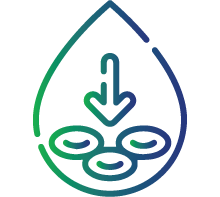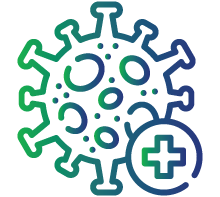
Newborn Screening (NBS) – 5 Biochemical + Hemoglobinopathies Test
Newborn Screening (NBS) – 5 Biochemical + Hemoglobinopathies Test
Newborn Screening (NBS) is a crucial early diagnostic tool used to detect inherited metabolic disorders and hemoglobinopathies in newborns. The NBS 5 Biochemical + Hemoglobinopathies Test screens for five key metabolic conditions along with disorders affecting hemoglobin production. Early detection enables timely intervention, preventing severe complications and improving long-term health outcomes.
Metabolic disorders and hemoglobinopathies are often asymptomatic at birth, making early screening essential for prompt treatment and management. Conditions such as amino acid disorders, organic acidemias, and fatty acid oxidation disorders can be life-threatening if untreated, while hemoglobinopathies like sickle cell disease and thalassemia can lead to chronic health issues.
Conditions screened in the NBS 5 Biochemical + Hemoglobinopathies Test include
- Phenylketonuria (PKU) – A disorder that prevents the metabolism of phenylalanine, leading to intellectual disabilities if untreated.
- Congenital Hypothyroidism (CH) – A deficiency in thyroid hormone production, which can cause growth and developmental delays.
- Galactosemia – A metabolic disorder affecting the ability to process galactose, potentially leading to liver damage and cataracts.
- Maple Syrup Urine Disease (MSUD) – A defect in the metabolism of branched-chain amino acids, causing neurological damage.
- Medium-Chain Acyl-CoA Dehydrogenase Deficiency (MCADD) – A disorder affecting fatty acid metabolism, leading to low blood sugar and energy crises.
- Hemoglobinopathies:
· Sickle Cell Disease (SCD) – A genetic disorder causing abnormal hemoglobin formation, leading to anemia, pain crises, and organ damage.
Beta-Thalassemia and Alpha-Thalassemia – Disorders that affect hemoglobin production, leading to chronic anemia and growth delays.
What is the NBS 5 Biochemical + Hemoglobinopathies Test Used For?
This test is used to:
- Detect metabolic disorders that can affect an infant’s growth and development.
- Identify hemoglobinopathies that may cause anemia and other complications.
- Guide early intervention to prevent severe health outcomes.
- Support genetic counseling for affected families.
Which tests are Included?
Symptoms of Disorders Screened in NBS 5 Test Without early detection, affected infants may experience

Feeding difficulties and vomiting

Lethargy and poor weight gain

Developmental and cognitive delays

Severe anemia and jaundice

Increased risk of infections
Preparation for the Test
No special preparation is required. A heel-prick blood sample is collected within 24-48 hours of birth. The sample is analyzed using tandem mass spectrometry and hemoglobin electrophoresis.
Interpretation of Results
Newborn screening results are categorized as Normal, Borderline, or Abnormal, requiring different follow-up actions.
1. Biochemical Screening Interpretation:
|
Test |
Normal Range |
Abnormal Findings |
Possible Condition |
|
17-Hydroxyprogesterone (17-OHP) |
≤ 30 ng/mL |
↑ Elevated |
Congenital Adrenal Hyperplasia (CAH) |
|
Immunoreactive Trypsinogen (IRT) |
< 60 ng/mL |
↑ Elevated |
Cystic Fibrosis (CF) (Confirm with sweat chloride test) |
|
Phenylalanine (Phe) |
< 2 mg/dL |
↑ Elevated |
Phenylketonuria (PKU) |
|
Galactose (GAL) |
< 10 mg/dL |
↑ Elevated |
Galactosemia |
|
Thyroid-Stimulating Hormone (TSH) |
< 10 µIU/mL |
↑ Elevated |
Congenital Hypothyroidism (CH) |
2. Hemoglobinopathy Screening Interpretation:
|
Hemoglobin Type |
Interpretation |
Possible Condition |
|
HbA & HbF (Normal) |
No abnormal hemoglobin detected |
Normal |
|
HbF only |
Possible β-Thalassemia Major |
Requires follow-up |
|
HbS detected |
Possible Sickle Cell Disease (SCD) or Sickle Cell Trait |
Confirm with molecular testing |
|
HbE, HbC, or HbD detected |
Possible Hemoglobinopathy (Thalassemia, Hb Variants) |
Further evaluation needed |
FAQs
Why is newborn screening necessary?
Newborn screening helps detect life-threatening conditions early, allowing for immediate medical intervention.
How is the test performed?
A small heel-prick blood sample is taken and analyzed for biochemical markers and hemoglobin abnormalities.
What happens if my baby has an abnormal result?
Further confirmatory tests and specialist evaluations will be conducted before treatment begins.
Can these conditions be treated?
Yes, treatments may include specialized diets, enzyme replacement therapy, hormone therapy, or blood transfusions.
Is newborn screening mandatory?
Newborn screening is standard practice in most countries, though specific panels may vary by region.

